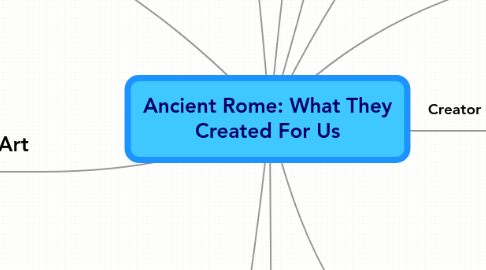
1. Architecture
1.1. Methods of Architecture
1.1.1. Arches
1.1.2. Columns
1.1.3. Cement
1.2. Important Buildings
1.2.1. Theaters
1.2.2. Houses
1.2.2.1. Apartments
1.2.3. Baths
1.2.4. Libraries
1.2.4.1. Vancouver Library - Colosseum look alike
2. Art
2.1. Craft Workers
2.1.1. The Industry
2.2. Portraits and Sculpture
2.2.1. Transition From Greek To Roman
2.2.1.1. Transition in Portraits
2.2.1.2. Transition in Sculpture
2.3. Painting
2.4. Mosaics
3. Geography and Climate
3.1. Italy
3.1.1. Apennine Mountains
3.2. Rome
3.2.1. Advantages
4. Technology
4.1. Aqueducts
4.1.1. Tools and Methods
4.2. Roman Roads
5. Religion
5.1. Gods and Goddesses
5.2. State Religion
5.2.1. Pontifex Maximus
5.2.1.1. Four Colleges
5.2.1.1.1. Pontifical College
5.2.1.1.2. Pontifices
5.2.1.1.3. Flamines
5.2.1.1.4. Vestal Virgins
5.3. Festivals
5.4. Foreign Cults
5.5. Household Worship
5.6. Omens
5.7. Prayer and Sacrifice
5.8. Temples
6. Law
6.1. Women Role
6.2. Twelve Tables
6.2.1. The Creation of the Tables
6.2.2. Points of Intrest
6.3. Roman Status
6.4. Roman Litigation
6.5. The Judge
6.5.1. Judging a Case
6.6. The Roman Republic's Constitution
6.6.1. What Exists Today
7. Writing
7.1. Latin
7.2. Style
7.3. Materials
7.4. Libraries
7.5. Books
7.5.1. Considered Treasures
7.5.2. Created by Copying Naration
7.6. Newspaper
7.7. Postal Systems
8. Military
8.1. Legions
8.1.1. Structure of Organization
8.2. Camp Structure
8.3. Standards
8.4. Armor and Defense
8.5. Purpose
9. Government
9.1. Foundation
9.1.1. Partitians
9.1.2. Equites
9.1.3. Plebeian
9.2. Structure
9.2.1. Magistrate Positions That Helped the Republic
9.3. The Senate
9.4. The Centuriate Assembly
9.5. The Consuls
9.5.1. Two Consuls
9.6. The Emperor
10. Economy
10.1. Agriculture
10.2. Trade
10.2.1. Sea vs. Road
10.3. Imports
10.3.1. Coinage System
